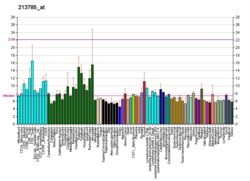| IPO9 | |||||||||||||||||||||||||||||||||||||||||||||||||||
|---|---|---|---|---|---|---|---|---|---|---|---|---|---|---|---|---|---|---|---|---|---|---|---|---|---|---|---|---|---|---|---|---|---|---|---|---|---|---|---|---|---|---|---|---|---|---|---|---|---|---|---|
| Identifiers | |||||||||||||||||||||||||||||||||||||||||||||||||||
| Aliases | IPO9, Imp9, importin 9 | ||||||||||||||||||||||||||||||||||||||||||||||||||
| External IDs | MGI: 1918944; HomoloGene: 5874; GeneCards: IPO9; OMA:IPO9 - orthologs | ||||||||||||||||||||||||||||||||||||||||||||||||||
| |||||||||||||||||||||||||||||||||||||||||||||||||||
| |||||||||||||||||||||||||||||||||||||||||||||||||||
| |||||||||||||||||||||||||||||||||||||||||||||||||||
| |||||||||||||||||||||||||||||||||||||||||||||||||||
| |||||||||||||||||||||||||||||||||||||||||||||||||||
| Wikidata | |||||||||||||||||||||||||||||||||||||||||||||||||||
| |||||||||||||||||||||||||||||||||||||||||||||||||||
Importin-9 is a protein that in humans is encoded by the IPO9 gene.
References
- ^ GRCh38: Ensembl release 89: ENSG00000198700 – Ensembl, May 2017
- ^ GRCm38: Ensembl release 89: ENSMUSG00000041879 – Ensembl, May 2017
- "Human PubMed Reference:". National Center for Biotechnology Information, U.S. National Library of Medicine.
- "Mouse PubMed Reference:". National Center for Biotechnology Information, U.S. National Library of Medicine.
- Jakel S, Mingot JM, Schwarzmaier P, Hartmann E, Gorlich D (Feb 2002). "Importins fulfil a dual function as nuclear import receptors and cytoplasmic chaperones for exposed basic domains". EMBO J. 21 (3): 377–86. doi:10.1093/emboj/21.3.377. PMC 125346. PMID 11823430.
- Hirosawa M, Nagase T, Ishikawa K, Kikuno R, Nomura N, Ohara O (Jan 2000). "Characterization of cDNA clones selected by the GeneMark analysis from size-fractionated cDNA libraries from human brain". DNA Res. 6 (5): 329–36. doi:10.1093/dnares/6.5.329. PMID 10574461.
- "Entrez Gene: IPO9 importin 9".
Further reading
- Zhang QH, Ye M, Wu XY, et al. (2001). "Cloning and Functional Analysis of cDNAs with Open Reading Frames for 300 Previously Undefined Genes Expressed in CD34+ Hematopoietic Stem/Progenitor Cells". Genome Res. 10 (10): 1546–60. doi:10.1101/gr.140200. PMC 310934. PMID 11042152.
- Mühlhäusser P, Müller EC, Otto A, Kutay U (2001). "Multiple pathways contribute to nuclear import of core histones". EMBO Rep. 2 (8): 690–6. doi:10.1093/embo-reports/kve168. PMC 1084005. PMID 11493596.
- Strausberg RL, Feingold EA, Grouse LH, et al. (2003). "Generation and initial analysis of more than 15,000 full-length human and mouse cDNA sequences". Proc. Natl. Acad. Sci. U.S.A. 99 (26): 16899–903. Bibcode:2002PNAS...9916899M. doi:10.1073/pnas.242603899. PMC 139241. PMID 12477932.
- Lubert EJ, Sarge KD (2003). "Interaction between protein phosphatase 2A and members of the importin beta superfamily". Biochem. Biophys. Res. Commun. 303 (3): 908–13. doi:10.1016/S0006-291X(03)00434-0. PMID 12670497.
- Ota T, Suzuki Y, Nishikawa T, et al. (2004). "Complete sequencing and characterization of 21,243 full-length human cDNAs". Nat. Genet. 36 (1): 40–5. doi:10.1038/ng1285. PMID 14702039.
- Bouwmeester T, Bauch A, Ruffner H, et al. (2004). "A physical and functional map of the human TNF-alpha/NF-kappa B signal transduction pathway". Nat. Cell Biol. 6 (2): 97–105. doi:10.1038/ncb1086. PMID 14743216. S2CID 11683986.
- Gerhard DS, Wagner L, Feingold EA, et al. (2004). "The Status, Quality, and Expansion of the NIH Full-Length cDNA Project: The Mammalian Gene Collection (MGC)". Genome Res. 14 (10B): 2121–7. doi:10.1101/gr.2596504. PMC 528928. PMID 15489334.
- Kimura K, Wakamatsu A, Suzuki Y, et al. (2006). "Diversification of transcriptional modulation: Large-scale identification and characterization of putative alternative promoters of human genes". Genome Res. 16 (1): 55–65. doi:10.1101/gr.4039406. PMC 1356129. PMID 16344560.
This article on a gene on human chromosome 1 is a stub. You can help Misplaced Pages by expanding it. |





